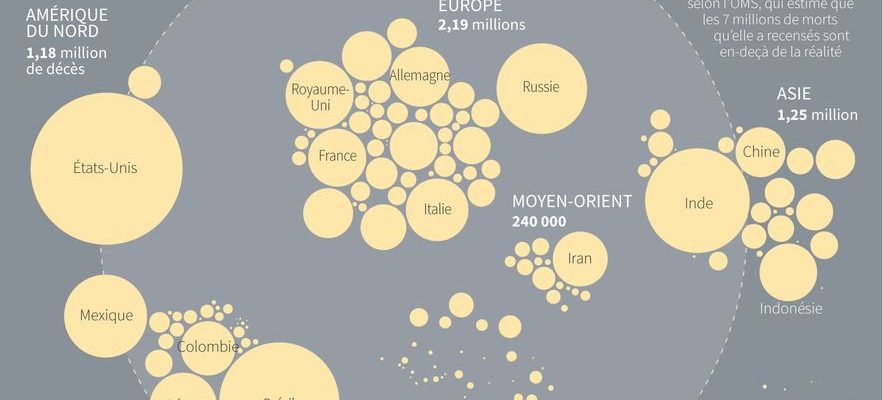What remains of this epidemic? For several months, the Covid-19 has been almost non-existent in the public debate. If it was only a distant memory, masks and social distancing are again on the Tour de France, which starts from Bilbao this Saturday. Indeed, caution is still in order. “Even though it is no longer a global public health emergency, Covid-19 has not gone away.” This infectious disease remains responsible for “nearly 1,000 new deaths” each week in Europe, warned Hans Kluge, director of the European office of the World Health Organization (WHO), Tuesday, June 27. A way to temper the statement of the WHO, on May 5, affirming that the Covid-19 pandemic no longer constituted a global health emergency.
More locally, where are the Covid-19 figures in France? Public Health France continues to publish the virus related data, although they are no longer relayed daily, as may have been the case at the height of the pandemic. As of June 27, the number of contaminations amounted to 1,680 new cases of Covid-19. A figure which is on the downward slope, since it fell by 18.9% in one week. Unsurprisingly, the incidence rate is moving in the same direction, as it continues to decline. It is estimated at 12.4 cases per 100,000 inhabitants over the past seven days. It was 420.05 over the same period in 2022. Note that only three regions have an incidence rate above 11. Corsica and the Provence-Alpes-Côte d’Azur region have an incidence rate of 17 .
If we dissect the incidence rate by age group, we note that people over 90 show 37 cases per 100,000 inhabitants, the week of June 12. Proof that the epidemic is losing ground, this figure reached 157 the week of May 1. Among those 18 years of age or older, the incidence rate was 19.3 per 100,000 population.
Covid-19: “at least 20 million dead”
© / afp.com/Valentin RAKOVSKY, Jean-Michel CORNU
Long Covids are resisting
For their part, data related to medical care confirm the decline of Covid-19. The week of June 26, Public Health France recorded 41 emergency visits, a drop of 48.8% in seven days. There are, in total, 310 hospitalizations over the last seven days, a decrease of 31.6% over one week. In addition, there were 41 critical care admissions (-32.8%). If the Covid-19 circulates less in France, it is thanks to vaccination and respect for the barrier gestures which have made it possible to stem the epidemic. On December 12, 2022, 17.7% of adults consistently wore masks in public places.
But it is not because the Covid-19 is more discreet that it does not continue to pose problems. Every day, people continue to die: Public Health France has recorded 45 deaths over the past seven days. “It is undoubtedly a minimum, because we no longer measure the incidence of the disease at all given the number of very low tests currently carried out, including in hospitals”, explained to L’Express Dominique Costagliola , epidemiologist and research director emeritus at Inserm. In total, there have been 161,642 deaths linked to Covid-19 in France since the start of the epidemic.
Another black spot that has not disappeared with the pandemic: long Covids. They concern 1 in 30 Europeans over the past three years. Still according to Public Health France, 2 million people had a post Covid-19 condition at the end of 2022 in France. These individuals, who have been infected with the virus, report suffering from prolonged or recurrent symptoms impairing their daily functioning several weeks or even several months after infection. According to its latest study carried out between September and November 2022 among the adult population in metropolitan France, the prevalence of post-Covid-19 disease (according to the WHO definition) is estimated at 4% in the general adult population (corresponding to 2.06 millions of people).
And in detail? “21.3% of people reporting a post Covid-19 condition were infected during the wave of the Delta variant and 53.2% during the waves of Omicron variants”, adds Public Health France. One thing is certain: this phenomenon is still very poorly understood, while scientists have not yet found a cure or established explanations. Thus, after the emergency phase, we enter a long management of Covid-19. It is also an opportunity to take stock of this pandemic in order to be better equipped in the future.
